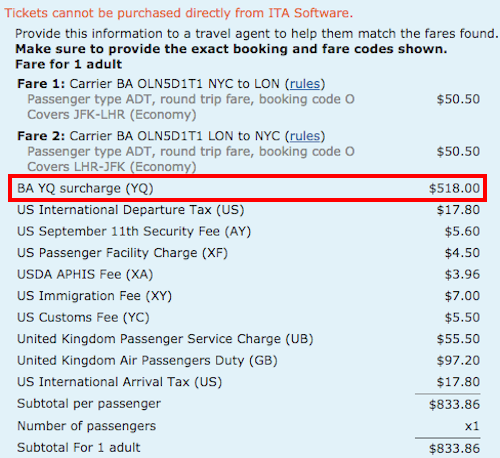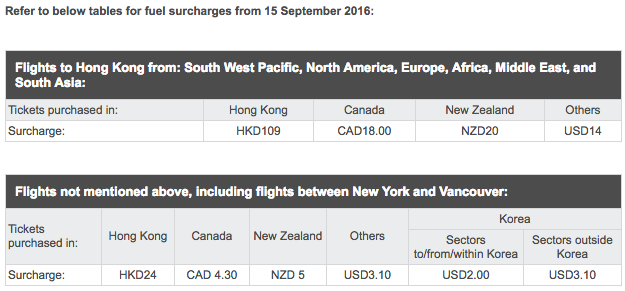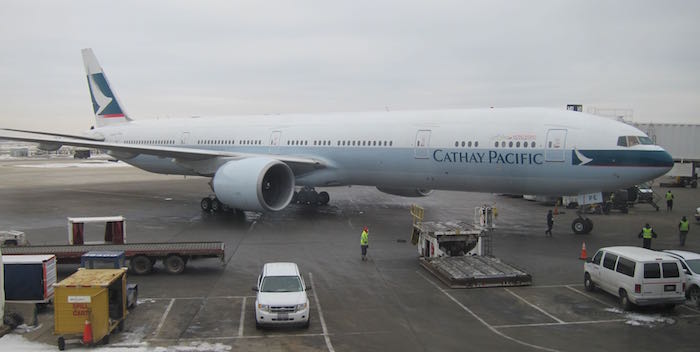Back when oil prices were at record highs, we saw several airlines introduce fuel surcharges. The intent was that they were supposed to help subsidize the increased cost in oil, and the general assumption was that they’d once again be lowered when oil prices went down.
Well, while oil prices have dropped, fuel surcharges haven’t. Even though oil prices have gone from one extreme to the other, airlines are gladly continuing to pass on these surcharges. They’ve simply changed how they market them (for legal reasons), from “fuel surcharges” to “carrier imposed surcharges.”
The whole concept is sort of laughable. For example, a roundtrip ticket on British Airways from New York to London costs ~$830, and ~$520 of that is “carrier imposed surcharges,” while the base fare is only ~$100. Perfectly rational, eh?

Here’s a move which is being marketed in a bizarre way. Cathay Pacific is adding fuel surcharges to most tickets booked starting September 15, 2016. The first thing that’s surprising here is that they’re not even trying to mask this — they’re calling them “fuel surcharges” and not “carrier imposed surcharges.”
Here’s the chart with how much the fuel surcharges will cost per sector:

The fuel surcharges won’t apply for tickets issued in Hong Kong (due to local regulations), and won’t apply out of some other regions where laws prevent airlines from imposing these surcharges, like the Philippines. Since I know it’s a situation people face every day, the terms also indicate that no fuel surcharges apply for ground transportation between Bahrain and Dammam, Saudi Arabia. The more you know… 😉

So, what’s the logic here? In Cathay Pacific’s advisory about this new charge, they provide no explanation of why they’re adding these surcharges.
Well, Cathay Pacific’s profits fell by 82% in the first half of the year compared to last year, which is largely being attributed to losses incurred due to bad fuel hedging. Per Bloomberg,the airline reported losing 4.49 billion HKD from fuel hedging in the first half of 2016, which equates to roughly 580 million USD. OUCH!
So I think that explains this situation — Cathay Pacific is adding fuel surcharges to the cost of tickets because oil has gotten so cheap, and it’s costing them dearly.
(Tip of the hat to LoyaltyLobby)




What an interesting story. I remember maybe 10-15 years ago Southwest was one of the few airlines with a profit at that time and it was due to fuel hedging. I guess is the opposite result of taking that risk!
Airline fuel costs after hedging in an individual per airline thing. Some get their hedging right and some get it wrong, and some are just plain simple taken by a ride by the banksters and really don't know what they're doing, although one would hope no major airline should be in than latter category. They're hardly going to call it "CFO screw up surcharges" are they ;-)
Cathay stupid management team bought many oil future at around 80 dollars . Thus, Cathay is still using around 70% of their oil at around 80 dollars level, so they could not lower their price level easily. For the next few years, they are still going to be an expensive carrier to use.
example,hk arilines is promoting their business class from hk to tokyo for around 550 dollars, while cathay economy cost the same.
...
Cathay stupid management team bought many oil future at around 80 dollars . Thus, Cathay is still using around 70% of their oil at around 80 dollars level, so they could not lower their price level easily. For the next few years, they are still going to be an expensive carrier to use.
example,hk arilines is promoting their business class from hk to tokyo for around 550 dollars, while cathay economy cost the same.
emercycrite says:
September 7, 2016 at 7:55 pm
“The fuel surcharges won’t apply for tickets issued in Hong Kong for competitive reasons (since it’s Cathay Pacific’s home market)…”
Uh, pretty sure they don’t apply because HK law doesn’t permit it, not because of competitive reasons.
>>HK air authority banned airlines from collecting oil surcharges eariler on 2016 due to low oil prices.
As a frequent CX flyer this is part of a clear pattern lately of panicked and poorly thought-through attempts to reduce costs and increase prices for customers given their financial results. You can see this in declining quality of on board catering even in premium cabins (something they've never been brilliant at) and almost comically endless wait times lately on their reservation lines even for elite Marco Polo members, as they cut staff. This is...
As a frequent CX flyer this is part of a clear pattern lately of panicked and poorly thought-through attempts to reduce costs and increase prices for customers given their financial results. You can see this in declining quality of on board catering even in premium cabins (something they've never been brilliant at) and almost comically endless wait times lately on their reservation lines even for elite Marco Polo members, as they cut staff. This is an especially silly and insulting attempt to essentially raise ticket prices by labelling them fuel surcharges, as if we have to pay for their bad bets on the oil price.
Ironically what they need to do most I s DROP prices drastically - especially for their premium cabins from HK. This is their bread-and butter market and they are being murdered by their own Oneworld partners, especially since QR joined the alliance, offering a better on-board J product (they use 787s to HK) at often under half the price of Cathay. AA even getting in on the act, with their new HKG-LAX route using same hard product as CX and again generally asking only 50-60% of the price...
They fuel hedged expecting the price of fuel to increase only to get it wrong and now they are paying more money than what fuel actually costs.
"The fuel surcharges won’t apply for tickets issued in Hong Kong for competitive reasons (since it’s Cathay Pacific’s home market)..."
Uh, pretty sure they don't apply because HK law doesn't permit it, not because of competitive reasons.
@Merker
+1, for adding correct factual information instead of made up reasons.
I wonder if the added charges/surcharges have the advantage of not being taxed? For example, in the US doesn't the excise tax apply only the ticket cost & not other add-on charges? If that's true, it's a huge tax break for the airlines to avoid that tax
Cathay Pacific and Dragonair tickets issued or re-issued* for travel originating outside of Hong Kong on/after 15 September 2016 will have a fuel surcharge applied. The surcharge will apply per flight sector, including children and infant fares. No fuel surcharges apply for travel itineraries originating in Hong Kong.
The fuel surcharges will be adjusted in accordance with fuel prices on a monthly basis.
(we shall see)
The HK CAD determines the prevailing allowable fuel surcharge ex-HKG, and currently that number is zero. It's a moving target based on their assessment of fuel prices among other things. Given that the CAD has set the allowable fuel charges presently at nil, CX would be in violation of the CAD if they did. It has nothing to do with "competitive reasons".
@Ryan - had a similar experience. used AA miles to book AB ticket JFK-DUS. flight was cancelled a week out from trip. Agent offered me alternatives, but warned that using BA on the TATL portion would result in AA charging me for BA's "taxes". I asked for them to waive the "taxes" given the situation. Agent said "can't, they're taxes". I asked for a supervisor who rightly explained that the bulk of the fee is...
@Ryan - had a similar experience. used AA miles to book AB ticket JFK-DUS. flight was cancelled a week out from trip. Agent offered me alternatives, but warned that using BA on the TATL portion would result in AA charging me for BA's "taxes". I asked for them to waive the "taxes" given the situation. Agent said "can't, they're taxes". I asked for a supervisor who rightly explained that the bulk of the fee is a fuel surcharge, but said that AA can never get BA to waive the charge, and that AA has a policy of never eating a partner's surcharge on a flyer's behalf. On one hand, I hope he's right, so that I wasn't duped by this supervisor. On the other hand, that's sort of a rigid policy. I have no status but would hope that AA would cover the fees for a status flyer for whom only BA can complete a botched non-BA itinerary (e.g. day-of IRROPS).
If they're going to actually call it a fuel surcharge, then on US routes at least they need to set it in relation to the actual fuel cost they intend to recover or else they are going to see a ton of DOT complaints.
http://viewfromthewing.boardingarea.com/2015/02/20/airline-fuel-surcharges-may-be-illegal-heres-why-it-wont-matter/
That's why airlines make up meaningless names to replace 'fuel surcharge' http://viewfromthewing.boardingarea.com/2016/09/05/star-alliance-airline-sas-weve-always-war-eastasia/
If they're going to actually call it a fuel surcharge, then on US routes at least they need to set it in relation to the actual fuel cost they intend to recover or else they are going to see a ton of DOT complaints.
http://viewfromthewing.boardingarea.com/2015/02/20/airline-fuel-surcharges-may-be-illegal-heres-why-it-wont-matter/
That's why airlines make up meaningless names to replace 'fuel surcharge' http://viewfromthewing.boardingarea.com/2016/09/05/star-alliance-airline-sas-weve-always-war-eastasia/
Cathay Pacific cannot charge fuel surcharges for tickets departing from Hong Kong because of government regulation (the government agency disallowed fuel surcharges in Feb), not for competitive reasons...
@Karim you're totally right. American messed up my award internary to MAD the other day and I tried to convince the agent to put me on an alternative BA flight without charging me the difference, but the agent claimed there was nothing she could do because they were TAXES. She just kept insisting that the airline has no control over the taxes. Oh well. But, yeah, it's really deceptive.
I respect Cathay Pacific for profressing so much, even after being under Chinese occupation for years. Won't mind giving $14-15 extra to them. It might one day help Hong Kong in their freedom struggle as well.
What bothers me is that people actually believe the "taxes" on a transatlantic BA ticket are $500+ when, in fact, taxes are a small portion of these extra charges - it makes it appear that it is a government charge when it is not. I often hear people say "oh on plane tickets it is the taxes that kill you"... not really.
When I buy tickets, I comparison-shop based on the total price; how the amount is allocated isn't really relevant to me. BA's total prices aren't that different from those of other airlines they compete with on a given route.
Where fuel charges make a huge difference is on award tickets. Is CX applying fuel surcharges to awards, both their own and their partners'? That's the question.
So it's $14 worth?
Not going to cry about this and be thankful it's all they're asking for.